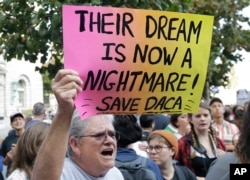Laura Lopez is a Mexican immigrant living in Florida who has been racing against time to avoid deportation.
Lopez said she arrived at the post office just after the cutoff time and missed the deadline set by President Donald Trump to renew her paperwork for the Deferred Action for Childhood Arrivals program that helps young immigrants brought into the country illegally.
Lopez, 30, blamed the chaos of Hurricane Irma while juggling a move from Miami to Daytona Beach as reasons why she missed the cutoff.
As a result, her status as a recipient of DACA ends Friday. Her driver's license, car insurance and housing lease are all in jeopardy once the program goes away for her.
"Everywhere I go, everything and everyone reminds me I have an expiration date" said Lopez, who is still trying to show proof that she attempted to send her renewal package the day before the October 5 deadline. "The government is playing with the lives of families."
Lopez is one of thousands of immigrants who are losing their protection from deportation under the administrative program established by President Barack Obama in 2012, including many who missed the deadline or saw their applications lost in the mail. The immigrants also are being provided a glimpse of what will happen if Congress is unable to come up with a permanent replacement. Thousands more will start seeing their protections end in March.
Here are some questions and answers about the process:
Why the rush?
In theory, DACA recipients should be protected until March.
Under the program, immigrants get two-year permits that let them work and remain in the country. Trump rescinded the program this year, but he let immigrants renew their papers if they were set to expire between September and March. Immigrants had to reapply by October 5 and pay a $495 fee.
The government said 132,000 of the 154,000 people eligible for DACA renewals applied in time, leaving more than 20,000 without protection from deportation.
There have been other problems.
U.S. Citizenship and Immigration Services (USCIS) said 900 requests were mistakenly rejected for being late, despite having arrived at the filing sites on time. Those applicants were told to reapply by December 2.
The agency said it was still working to determine how many requests were affected by U.S. Postal Service delays, following reports of late deliveries of documents from immigrants who sent their papers well in advance. These applicants are now waiting for instructions on how to resubmit their renewal requests.
Can these immigrants be deported?
Advocacy groups are highlighting the detention in Pennsylvania last week of a Guatemalan immigrant whose DACA renewal was reportedly among the ones delayed by the Postal Service. After Osman Aroche Enriquez, 26, was pulled over by police for what advocates said was an expired vehicle registration, he was transferred to Immigration and Customs Enforcement and detained for three days.
The agency released him based on what ICE called an "exercise of discretion."
"His case calls into question how many 'Dreamers' in similar situations are languishing in detention, and how many are living in fear of deportation due to expired status or post office delays," Church World Service said in a statement.
("Dreamers" is a term commonly used to refer to DACA recipients. It comes from the DREAM Act — Development, Relief and Education for Alien Minors — which offered protections similar to those in DACA but was never approved by Congress.)
The government does not turn over information about DACA recipients to deportation agents unless they are targeted for a criminal investigation. That means immigrants with expiring paperwork won't be automatically deported, but they can be if they get stopped by police or arrested on criminal charges.
Officials say there are no plans to change how the government handles personal information of applicants.
However, Francis Cissna, USCIS director, said "the guidance has always said that that policy could change. It has always said that; it still says that."
Where does Congress stand?
On Capitol Hill, the most promising avenue for legislation seems to be with a bipartisan group in the Senate, led by Senators Dick Durbin, an Illinois Democrat, and Lindsey Graham, a South Carolina Republican.
They claim good progress on negotiations to give young immigrants protections through legislation that would be added to a sweeping spending package next month.
But the White House is adamant that other issues, including Trump's long-promised U.S.-Mexico border wall and increased funding for immigration enforcement inside the country, be addressed in the package. The Trump administration is also planning to move to a merit-based immigration structure.
The path forward is assuredly tricky, but there is widespread bipartisan support for the young immigrants among lawmakers.
What could a solution look like?
Legislation would put the immigrants on a path to U.S. citizenship by granting permanent legal status to more than 1 million people who arrived before they turned 18 and pass background checks, among other criteria.
The bill proposes legalizing the status of those who were admitted to the DACA program.
The head of the agency that runs the program rescinded by Trump says any legislative fix will require money and time to implement, depending on how many people end up benefiting from the solution.






